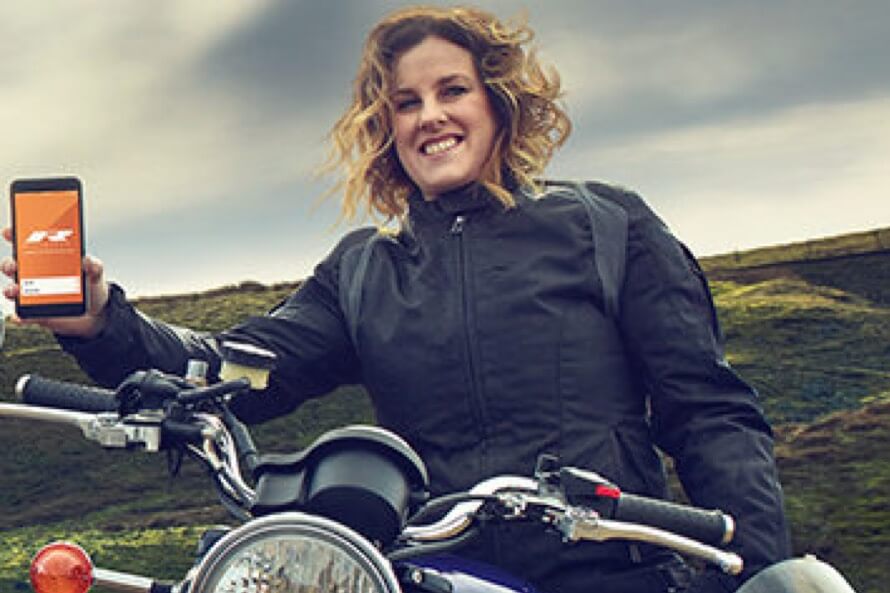
Interview: Karen Cole of the Motorcycle Industry Association
Karen Cole is one of the UK’s top experts on motorcycle safety and training, winning three awards last year including the Association of Industrial Road Safety Officers’ 50th Anniversary Award for Services to Road Safety, a British Dealer News Award for Services to Motorcycle Rider Training and Safety, and a National Couriers’ Safety Award – as well as receiving two finalist nominations in the Institute of the Motor Industry annual awards.
Karen, last time we spoke you weren’t riding due to injury. How is your recovery going?
I’ve been having physio and doing all my exercises, so am expecting to make a good recovery. At the moment I’m riding pillion, which is fun and different after being the one in charge for the past 35 years. You have to trust the person in front of you, which takes a leap in terms of mentality. I’m getting used to it though, but looking forward to getting hold of the handlebars again, when my back is fully up to it.
Did being injured alter your view of motorcycling at all?
No not really, as it wasn’t as a result of a motorcycle accident, just normal wear and tear. There is so much that riders can do to improve their safety on the road though.
OK, so how would you advise your fellow motorcyclists to stay alive? Do you have ONE pearl of wisdom to pass on?
Interesting question as I’ve sat in safety meetings with other stakeholders who have asked for a magic bullet, in looking for a simple campaign message to make a difference but it has always been really hard to identify one single thing. The reality is a few things need to be done. You’re probably going to guess what I’m going to say? Wear protective clothing, which stops a minor incident from becoming a major one. Stick to an appropriate speed, don’t overtake on a bend, don’t get too close to the vehicle in front, don’t presume people can see you and learn to read the road by taking advanced training. And don’t ever choose your training just by price. If I had to identify one single thing that might have an impact on the rest, it would be the training one. Good trainers embed the need for all the things I’ve mentioned, which is why the MCIA has set up a framework to signpost high quality training through MCIAC (check out the website to see if there’s an ‘accredited’ trainer near you www.mciac.co.uk)
Tell me about your job. You’re a bit of a star, winning all these awards! What do you love about your job and what drives you?
What drives me is that there is so much more that can be done to improve rider safety. Some in road safety circles just dismiss motorcycles as inherently dangerous. This is so short sighted and untrue and is used as an excuse to increase rider vulnerability.
What has changed in the area of motorcycle safety during the time you’ve been in your job?
One of the biggest shifts is in getting the police, local authorities and road planners to agree that motorcycling must be integrated into mainstream transport planning. We co-authored a document with the National Police Chiefs’ Council, which endorses the idea that encouraging responsible riding will help improve safety. The same ‘strength in numbers’ argument is also being used by the cycling lobby. There is a growing body of evidence to back this up from countries where both motorcycle and bicycle use is much higher.
What’s your view of the future of motorcycling and of road safety in general?
Motorcycling will increasingly become a mainstream transport choice, for people who don’t want to spend their lives in traffic queues. They need to be supported in this choice, with good road design, access to high quality training, and an increasing number of technological products to enhance safety.
Education is key. While single campaigns are often successful for a particular period of time, we need a much more permanent approach. We need road safety embedded in education as a matter of national policy, so that we produce a generation of savvy road users. So many road incidents are avoidable and education could reduce these. Rider education is vital too, which is why we are in the process of growing a network of high quality ‘accredited’ training schools. We want everyone in the country to be able to go to the website and find an accredited school near them.
OK, so back to nuts and bolts … what bike(s) do you ride and why?
As I said before, I’m just riding pillion at the moment on the back of a Suzuki Hayabusa (GSX1300R) but as MCIA has so many manufacturing members I am going to keep quiet about my current crush. Motorcycle Live is always the highlight of my year though, when I get to spend several hours looking at and sitting on all the new models being showcased for the first time in the UK.
And do you have any unfulfilled ambitions, either personally or professionally?
Professionally I want to see the motorcycles seen as a transport and leisure choice for discerning individuals and to do away with the ridiculous and outdated stereotypes that exist around motorcycles and riders. I’ve met so many laid back and interesting individuals who ride over the years and I’d love for that image of bikers to be the abiding one.
Thanks very much Karen, it was a pleasure to interview you.













